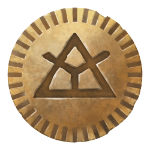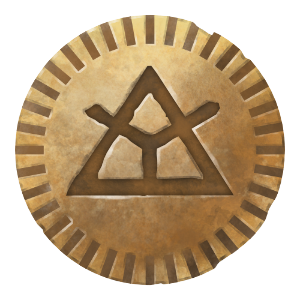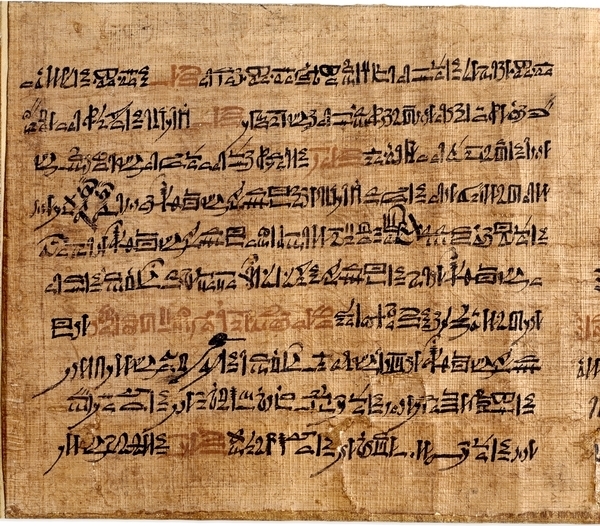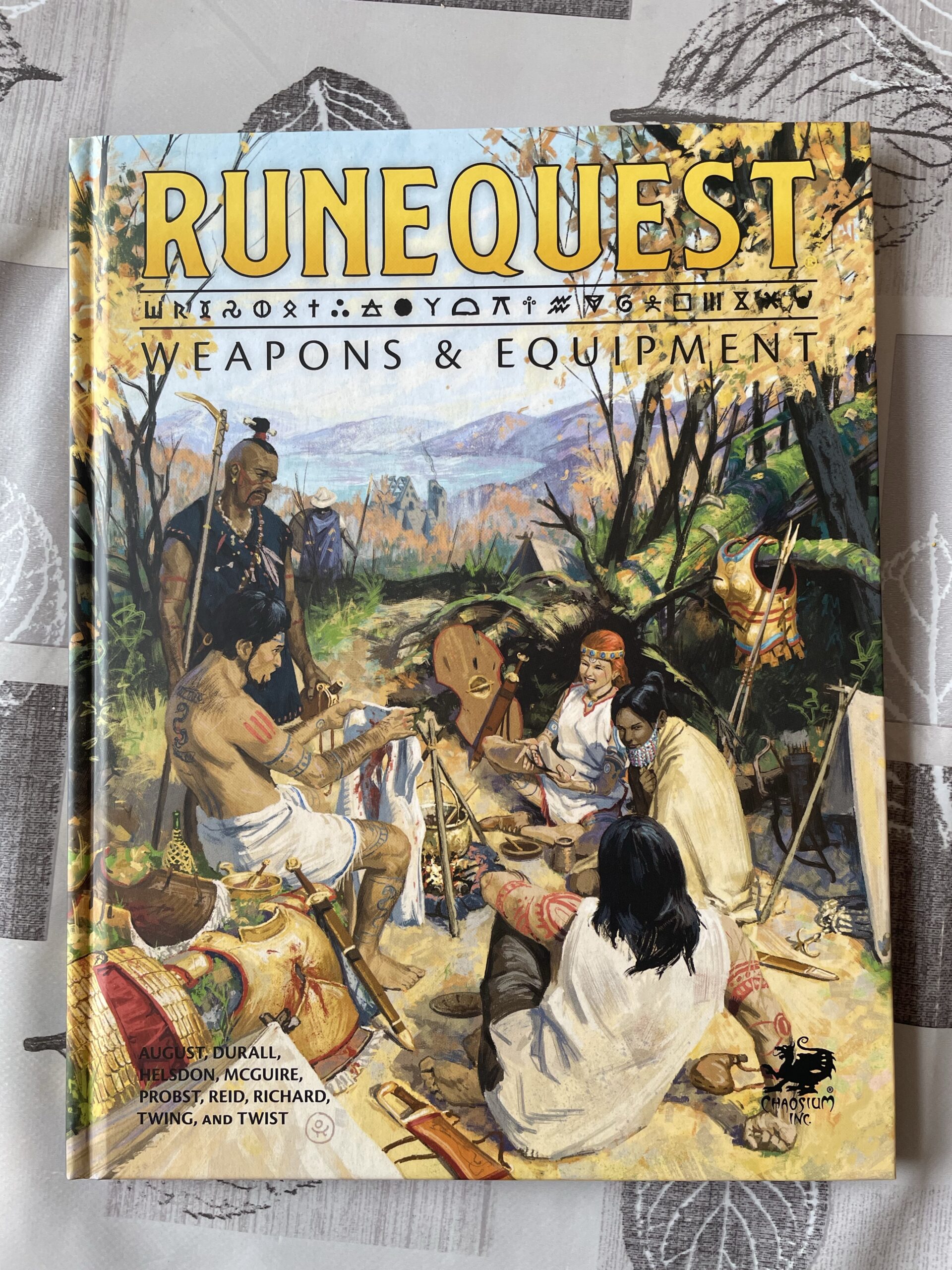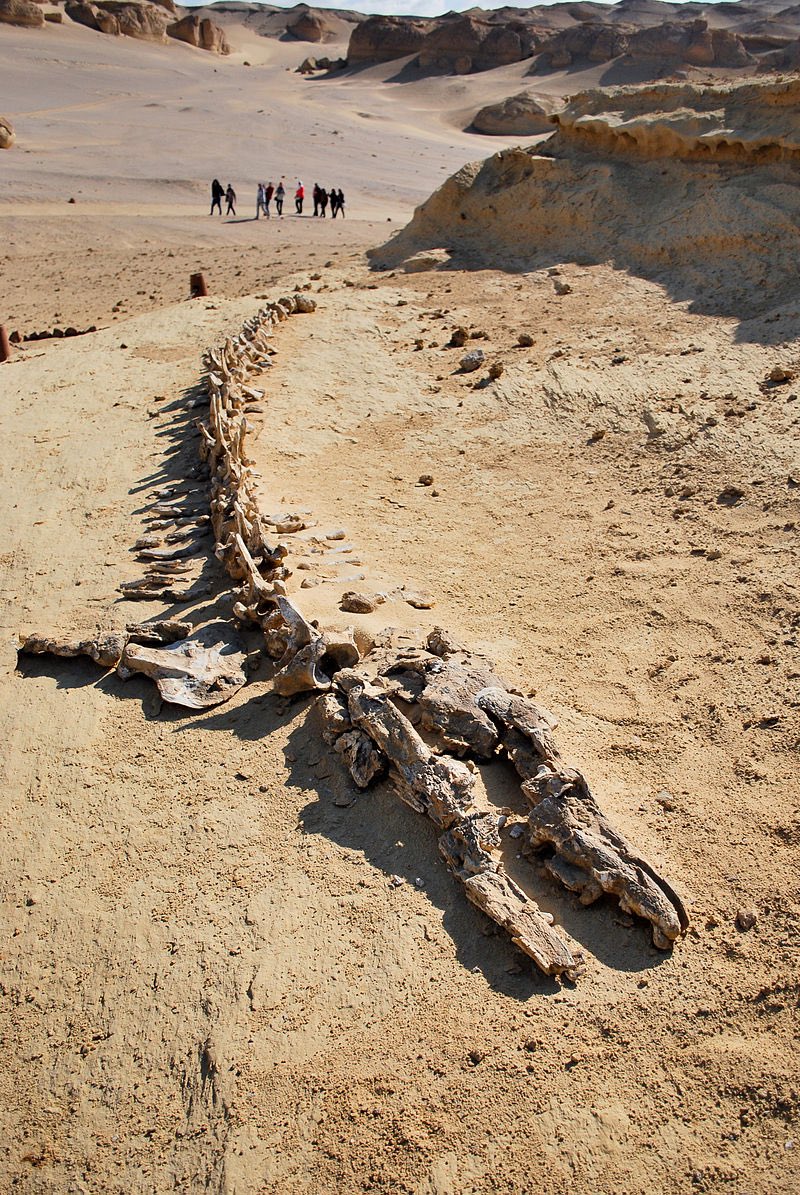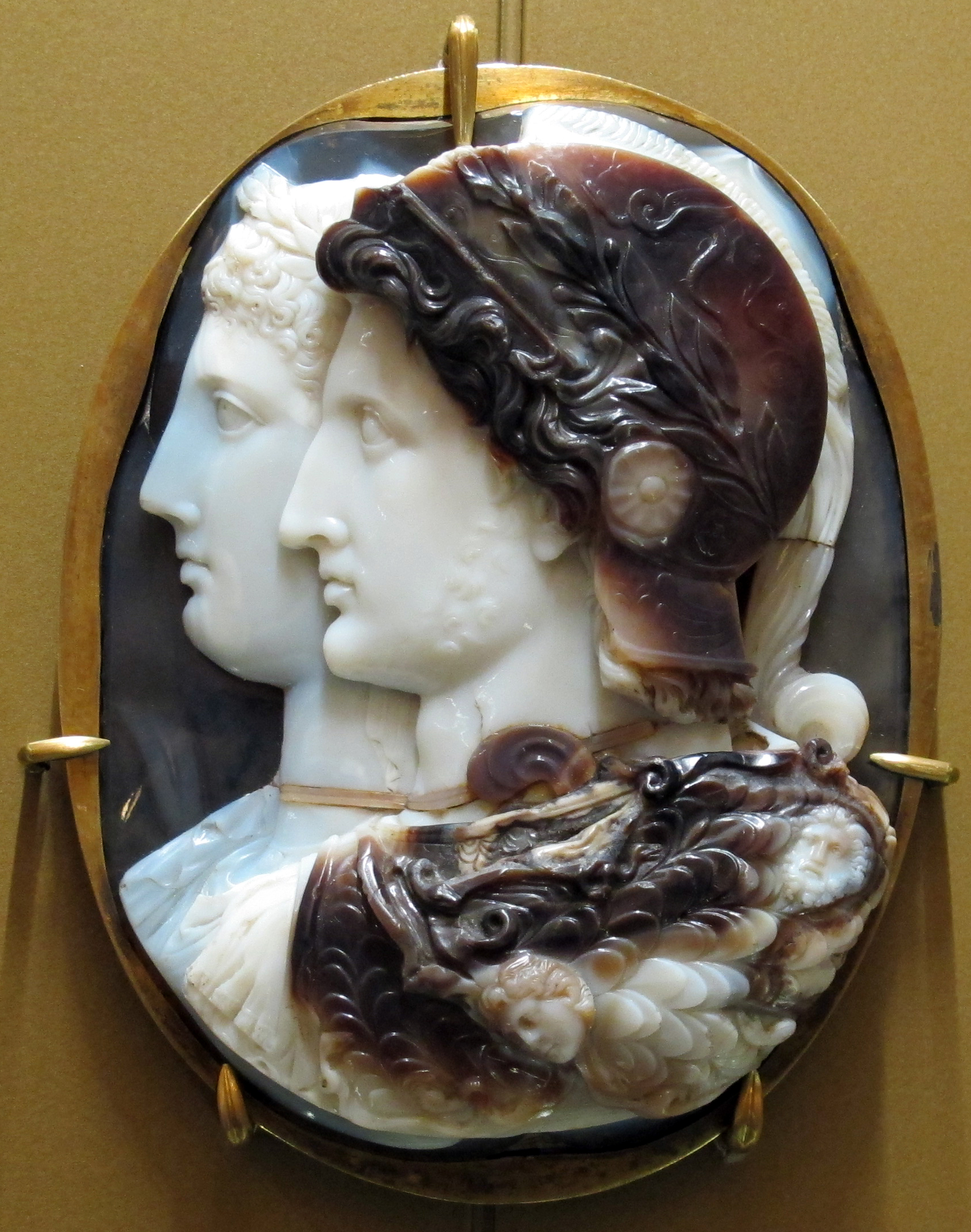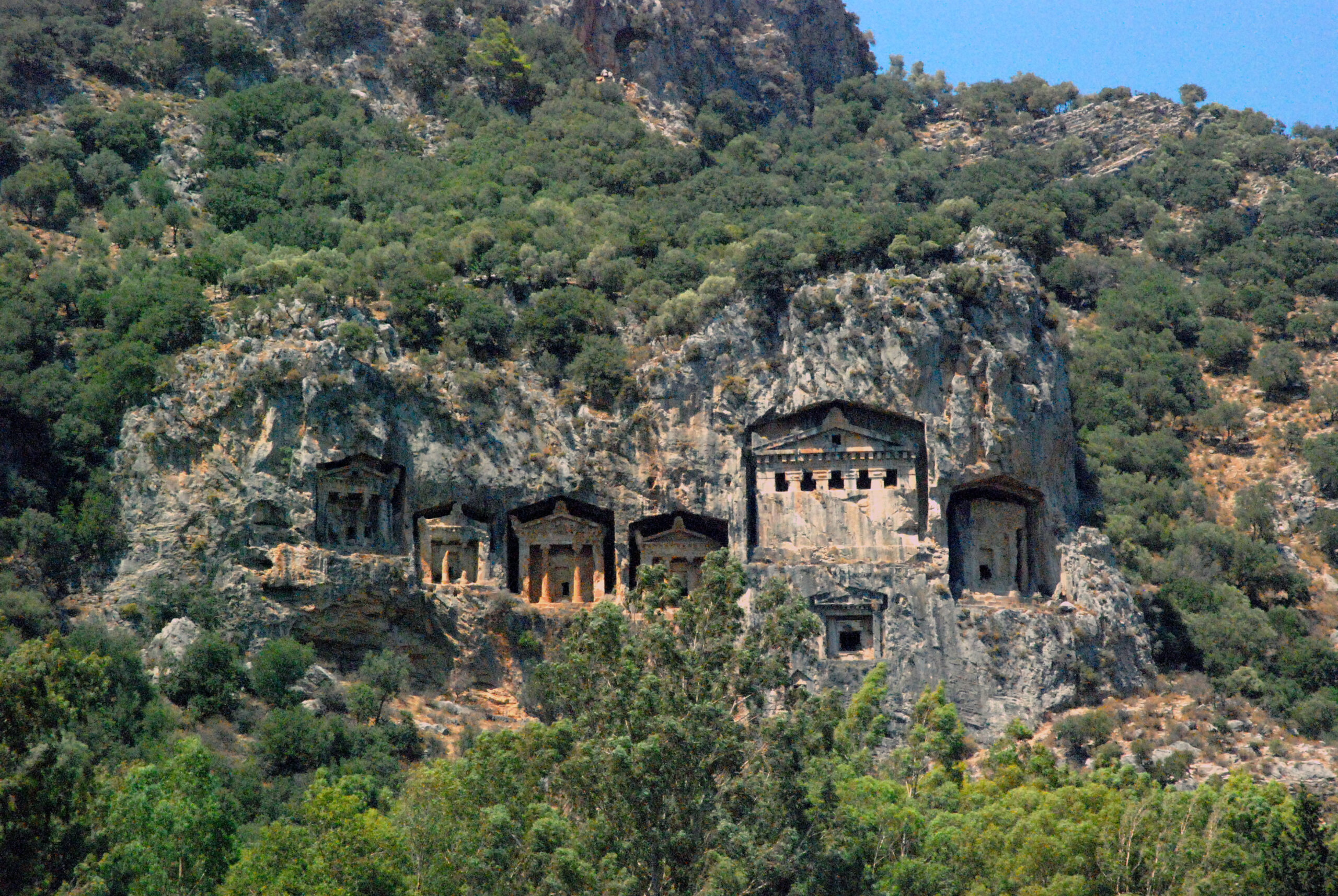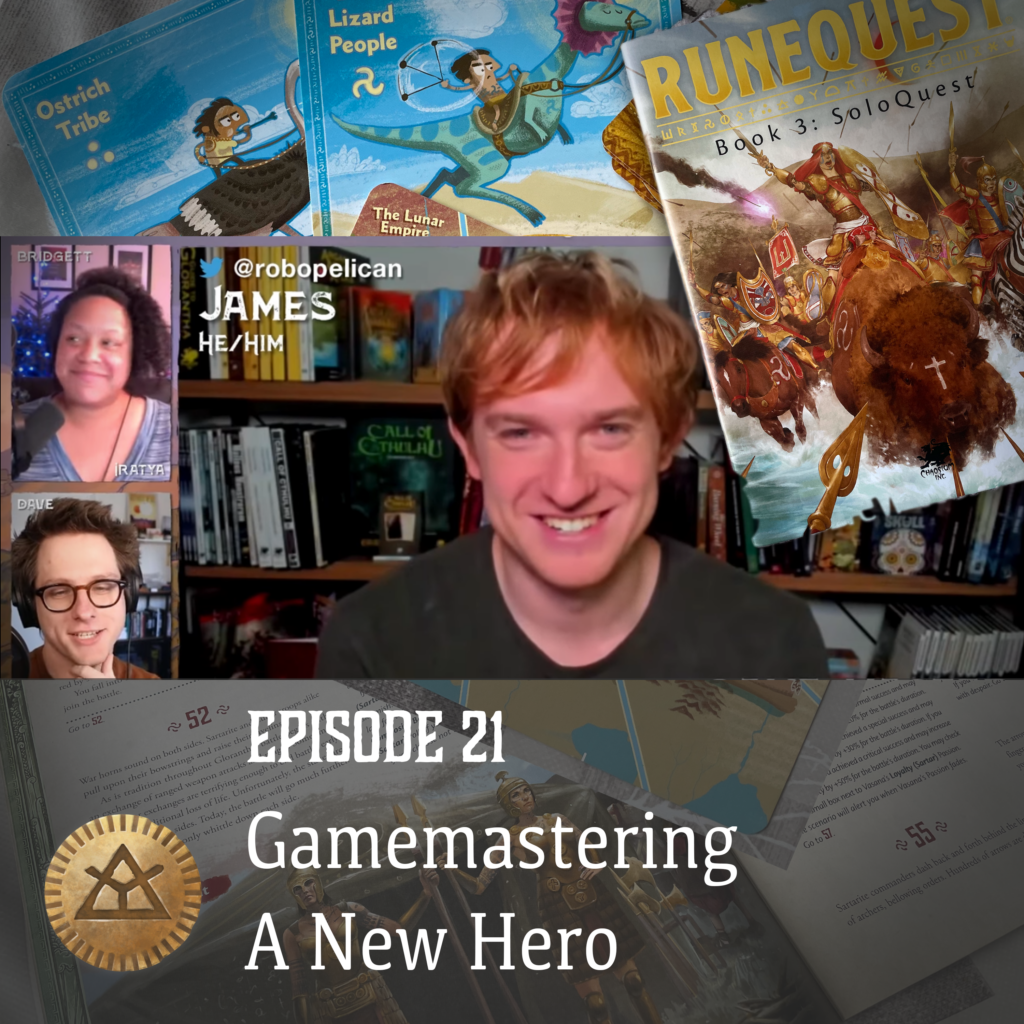
This episode starts with Jörg pronouncing our guest’s name wrongly! We welcome James Coquillat of Chaosium to talk about RuneQuest actual play and gamemastering.
James is both on the digital content team and on the editorial team for Call of Cthulhu. You can find James at the following online places:
- James’ personal website
- The Chaosium Youtube channel, and in particular:
- The Chaosium video interview series
- The RuneQuest Starter Stream (ended)
- A New Hero (ongoing)
- The Stream of Chaos Discord server (invite link here)
Show Notes
James tells us about his gaming and professional career. AD&D 2nd edition, Call of Cthulhu, screenwriting turning into video game production, and finally changing over into tabletop RPG production. Living in Melbourne brought him into contact with Michael O’Brien aka “MOB” (Chaosium’s vice president), Mark Morrison (Chaosium community embassador and part of the awesome Campaign Coins), and other notables from the Down Under roleplaying community. From there to Chaosium was not a big step.
James’s first work for Chaosium was helping with the translation of Khan of Khans. And while that is a Gloranthan game, it took some diving into the Chaosium back catalogue to familiarize himself with RuneQuest and Glorantha.
RuneQuest: Roleplaying in Glorantha was the first experience of both the game system and the world through play.
Ludo asks how much Gloranthan knowledge James had accumulated when he had the courage to present both the system and the setting publicly.
James explains that, to the folks at Chaosium (many of whom have been involved since before there were the Tales of the Reaching Moon in the early nineties), he fits into the demographic of young new players and GMs that they want to target with the new edition of RuneQuest. This is one reason why he was chosen to run the game between himself and his colleague David Naylor, who is a player in the RuneQuest stream along with Bridgett Jeffries, who we interviewed recently.
Jörg asks about how much James profits from the interviews with Jeff Richard (Chaosium’s vice president, creative director, and Glorantha lead designer). James confesses to have led the discussion towards upcoming features in his game every now and then.
Asked about his stumbling blocks with RuneQuest and Glorantha, James describes how coming from the typical Tolkienesque fantasy in most fantasy roleplaying games made the encounter with Glorantha something of a new territory. It was weird to encounter these tropes from the early days of the hobby. The beastmen were strange, not just the ducks but also creatures like scorpionmen or anthropomorphized animals. Chaos was a concept that was different from previous experiences.
To understand the big opponents of the Sartarites, James used the advice to think of the Lunars like the Roman Empire, and of the Praxian beast riders like the Mongol hordes invading Europe. Ludo commiserates that long-time Gloranthaphiles tend to use historical parallels that you may never have heard about before, like e.g. Thracians.
Another stumbling block for James was the multitude of gods that would pop up in the gaming material and the lore.
When asked whether James got to play RuneQuest Glorantha before running it, he explains that he was the GM for his local group.
As a long time Call of Cthulhu player and contributor James was familiar with the Basic Roleplaying system that was based on the original RuneQuest. Features specific to RuneQuest, like the different success levels or Strike Ranks, were alien and needed to get used to.
David Naylor gets another shout-out as being a great GM’s assistant (looking up rules on the fly when needed), and also for running the technical side of the streams.
Ludo asks where to get advice as a new GM if you don’t happen to be able to call Chaosium old-timers like Jeff or MOB. James suggests to start really small, isolating the initial setting enough so that the lore of the greater world is not yet required.
Jörg asks what material James used when he started GMing RuneQuest (for his friends). James started with the core rule books, but things came together when he got his hand on the Starter Set material (before it was published, as James and Dave designed the solo adventure in Book 3 of the Starter Set).
James describes how Dave and he had submitted a scenario for RuneQuest to Chaosium, which had gone through editorial feedback (and which was pending publication) before getting tasked with creating the Starter Set’s solo-adventure. Part of James and Dave’s approach was to make sure that the solo-adventure would work online as well.
James points out that the designers being relatively new to Glorantha was considered an advantage for creating the first contact for many players with both the rules and the setting.
Jörg asks about the ceremonies in the Starter Set’s SoloQuest which do require quite a bit of familiarity with the background, but those resulted from James and Dave rather than direct demands by the editors.
James talks about the feedback he got from his playtesters in his gaming group, including one player whose SoloQuest run ended in the protagonist dying in the decisive combat against Vostor after a long iteration of combat rolls, leading to another mechanic inserted to bring such a gridlock to a narratively pleasing end. That player ended up playing Vostor in the Starter Set scenarios!
James talks about his two previous GMing experiences. The first one was about a village facing the demands of both a Lunar tax collector and a Praxian warband, each demanding half the year’s production (which obviously could not be satisfied for both). The other one was more experimental, riffing on the Apocalypse Now upriver journey into hostile territory. Jörg remembers MOB’s scenario “Hut of Darkness” from Tales of the Reaching Moon which uses the same inspiration.
Ludo shifts the topic to the evolution of the shelves behind James in his videos. James talks about his growing collection, and shares how he moved three times during his work on the Chaosium YouTube channel. One time he dismantled and re-populated the shelf at a new home between a Sunday Call of Cthulhu recording and a Tuesday RuneQuest recording.
Ludo talks about his appreciation of the A New Hero stream and feels empowered by seeing James struggle with some of the crunch of the system while James still keeps the game flow. James talks about dealing with the crunch, again by keeping it focused, with deeper dives delayed while applying the principles of Maximum Game Fun and Your Glorantha Will Vary to the current game.
The New Hero stream doesn’t use published scenarios but uses original adventures. James explains that each of the streams has a focus on one specific product in the game line, and that would be the core rules book after having played the Starter Set scenarios on the previous stream.
The first theme would be the clan rivalry, and feedback from Jeff Richard suggested Greenstone as a suitable starting point for that kind of setting. Greenstone has one of the most important Earth temples in Sartar, which gave a logical backdrop for the characters’ backstory. The proximity of the Upland Marsh and its undead led to a follow-up on that theme, and so on.
Ludo asks about the sources used to research the region. James lists his sources, which included the Guide to Glorantha, the RuneQuest Glorantha Bestiary, the RuneQuest wiki, and the fan-maintained (and often not quite correct) Glorantha wiki for a general overview and for an idea what specifics to look up, and then using his access to the previously published material on the setting.
Ludo points out that the Bestiary is a lot more than just a catalogue of monsters: it also contains a significant amount of world-building, worth a read-through rather than just skimming for single monster stats.
As the only grognard in the podcast, Jörg cannot help but reminisce his experience playing in a Freeform set in the Greenstone region around the time the current tribes were formed, and how the rivals of the resident Orleving clan were the first presentation of clan life in Sartar in the RuneQuest 3rd edition Genertela box, still available in the free collection called “HeroQuest Voices“. These are in-world instructions to young adults in the various cultures and regions of Glorantha. They are excellent as player-facing hand-outs to get an idea about the setting. The individual content is available for download at the bottom of this page.
When asked for advice to get started, James first points to the online version of the Starter Set SoloQuest.
James’ next tip is that the new GM should select the pre-generated characters in the Starter Set that they feel comfortable with, and offer that selection to the players as the group composition will be influential on the style of the game.
James suggests to take the Strike Rank system not so much as a fixed turn order but just as an aid to determine who goes first after all the actions have been announced.
James then suggests that, to get a feel for the style of the setting, look at the real-world inspirations for cults, like ascetic monks for Humakt or fertility goddess and rites for Ernalda. Also look at the religions and try to make sense of interactions and parallels. Just asking whether it is coincidence that there are seven Lightbringers and Seven Mothers can lead to insights, for instance, and comparing it to the Roman re-interpretations of Greek mythology in their own pantheon.
Ludo asks about the Session Zero and determining the style and orientation of the campaign. James talks about setting the mood of the game (like leaving silly jokes at the door for a game of the Alien RPG), along with extra demands when running a game on a public stream. For the New Hero stream, they initially kept it small and focused, while for the Starter Set stream they would just jump in to get the general experience.
Jörg asks about the players derailing the original ideas for the session, and James tells about a whole subplot that was avoided by the players involving a fight against zombies inside a horse stable with horses trapped, and then centaurs coming to the rescue. That did not happen, and neither did the players return to a village on the edge of the Marsh to get more information on the undead, leaving a whole set of small subplots unplayed.
Ludo asks about personal favourite and least favourite aspects of the setting. James starts with confessing his love for the ducks of Glorantha, a concept that initially seemed alien, 1970ish, but resonating with his love for Duck Tales and an early tabletop roleplaying experience with a DIY game called Duckromancer (not the commercially available game by the same name, but a game where you play ducks and have skills like Duckplomacy and other puns galore). He also likes the Mostali, thanks to exposure to an enthusiastic fan at a convention. Stuff James enjoyed less were the big spanning political story arches as those are hard to make a connection with for new players unfamiliar with these struggles.
Ludo talks about how GMs coming from Call of Cthulhu are used to deal with rather ordinary people being tossed into stuff way beyond their pay grades, and how they (might) return from their adventure still as normal folk rather than big heroes. Switching to stories where the player characters are expected to be or become recognized heroes means a change in narrative style. James mentions how his academic background as a screenwriter ingrained all the narratological story-telling tropes, which mean that the hero emerges from a community, and at the end of the hero’s journey returns to that community.
We close the interview with our usual silly questions, like the favourite steed (bolo lizard), favourite culture (Orlanthi over Lunar or Praxian, with Sartar on the Praxian border possibly the ideal mixture), favourite cult (Humakt for the swords and asceticism, Urox the Storm Bull for the bad-ass boisterous guys), trollkin or ducks (ducks, of course), scorpionmen or undead (undead), favourite undead villain (Delecti over Brangbane), most interesting character homeland (Lunar Tarsh), and favourite runes (Death, Water, Truth, Fire).
Credits
The intro music is “The Warbird” by Try-Tachion. Other music includes “Cinder and Smoke” and “Skyspeak“, along with audio from the FreeSound library.
Podcast: Play in new window | Download (29.6MB)
Subscribe: Apple Podcasts | Spotify | RSS | More
